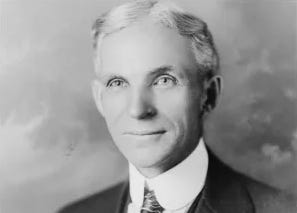Many of us feel a deep sense of “Imposter Syndrome” because we don’t know everything. The good news is that you don’t have to.
Henry Ford vs. the Chicago Lawyer
One of my favorite business stories comes from the life of Henry Ford (the godfather of the automotive industry, and founder/CEO of Ford Automobile).
Shortly after WWI, Henry Ford found himself in an argument with a toughened Chicago lawyer who insulted him by claiming that he was actually a very ignorant man. To prove his point (and his own supposed intelligence), the lawyer asked Ford a range of random questions such as “How many soldiers did the British send over to America to put down the rebellion of 1776?” and “What are the capitals of all the major countries in the world?”
Growing tired of the discussion, Ford finally decided to offer a challenge to the lawyer. He said:
“If I should really want to answer the foolish question you have just asked or any of the other questions you have been asking me, let me remind you that I have a row of electric push-buttons on my desk, and by pushing the right button, I can summon to my aid men who can answer any question I desire to ask concerning the business to which I am devoting most of my efforts.
Now, will you kindly tell me, why I should clutter up my mind with general knowledge, for the purpose of being able to answer questions, when I have men around me who can supply any knowledge I require?”
Embarrassed by this terse reply and unable to come up with a reply, the lawyer backed down and later offered an apology for questioning Ford’s intelligence.

Knowing how to get the answer > Knowing all the answers
Too often, we feel as though we need to “know it all” to be considered an expert in our professional field. It is certainly a wonderful thing to have a great depth of expertise. Many of the world’s leading experts are in the position they are in because they retain great stores of knowledge inside their heads. They know their field better than anyone else. We see these people on podcasts or being interviewed on TV, and think “That’s what I have to measure up to if I want to be considered a success in my field.”
I respectfully disagree with this view. When I worked in consulting, I was initially surprised at how many of my fellow consultants actually didn’t know all the latest advancements in their specialty fields or the latest news/facts. When I brought this up to a Senior Partner he said:
“The thing you need to remember in consulting (and other professions) is that knowing how to get the answer is far superior to knowing the answer yourself.”
In our careers, we will regularly encounter new problems, new technologies, and new information. It is so much that it frankly would be impossible to learn it all ourselves. This is why the most successful people I have observed are those who are skilled at finding answers whether that is via a tool like Google or ChatGPT, via their networks, or just plain experimentation / rolling their sleeves up and trying something.
One of the primary advantages of living in the modern world is (A) the existence of the world’s collective intelligence (in the form of the internet’s libraries, databases, and content), and (B) user-friendly tools (ex: Google, ChatGPT, search engines) that allow us to easily access this intelligence. You don’t need to be an academic to search and find this information. Even the most common layperson can do this. That is why there is so much advantage in developing your “finding answers” skillset.

This is what Henry Ford understood well. Although he lived long before the advent of Google he had literally built his own search engine in the form of what he called his “Master Minds” (the collection of men and women he could ring into his office and ask them any question he needed the answer to). Ford regularly cited his decision to focus his skill on “getting answers” (instead of trying to learn it all himself) as one of the foundations for his (and Ford Co’s) extreme success.
Conclusion
I once remarked to my wife that if I were transported back in time (to say the Middle Ages or the 1800s) I would probably struggle to survive. Many of my skills (ex: knowing how to Google Slueth my way through complex data to make a decision, manage large teams/projects, etc.) wouldn’t be applicable in an era where the knowledge that lived in your head (or hands) determined whether you ate/starved.
Fortunately (for me) the modern era is a completely different game. There will also be a great deal of value placed on skilled craftsmen or “experts”. But “experts” in particular are in danger of being disrupted by those who are experts in the art of “answer finding”.
This is one reason why AI looms so large over the knowledge worker economy. It represents our ability to “Google something”, but at 10X the speed & effectiveness. In the hands of a skilled operator, that is a potent tool.
If you’re an expert, it might be time to start investing in building your own “mastermind” stack of tools and people who will help you survive the next few decades.
Remember that you actually don’t need to “know” all the answers. You just need to know how to get them.


